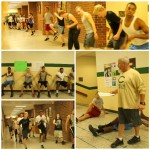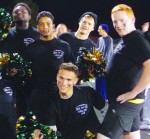By John Dunning
Staff Writer
If you live to be 100 years old, high school will only have accounted for four percent of your life. Think about that, then ask yourself how significant those four years were or are to you. Mandatory secondary education comprises over half of our teen years, but only a small fraction of our overall life.
Classes offered at Northwood allow students to expose themselves to a variety of knowledge and information.
“[High school is about] how to begin to develop the world beyond yourself. As children the world is all about us, we’re the epicenter. We can’t help it though, we’re built in narcissists,” English teacher Jill Bone said. “I think high school provides the transition where you start to morph from ‘The world’s all about me’ to ‘Oh my God, I’m part of this larger universe.’”
Upon coming to the conclusion that they are “part of this larger universe” students will often seek out their role in society. Some students will know where they fit into the bigger picture, while others will have a bit of learning to do.
“People that are wired to have one idea and go straight forward are very successful in doing that, but I find when you give yourself opportunities to explore new things and grow in new areas, you can be given a better understanding of who you are,” art teacher Leslie Burwell said.
Civics and AP Government teacher Roddy Story’s high school experience was one that represents the second type of student Burwell described.
“I changed my mind a bunch of times about what I was going to do and it took me being exposed to a variety of different classes, interests and people before I was able to make a choice,” Story said.
Sometimes a specific class or academic experience will spark an interest that changes a student’s plans for the future.
“I didn’t really know what I wanted to do coming into high school. Everybody would ask me and other freshmen what we wanted to do in the future and where we wanted to go to college, but I never really had an answer,” junior Grayson Bryant said. “This year I started taking Auto-Tech and it’s been really fun. I like working on cars and fixing stuff. It’s definitely something I’d like to go to school for.”
Regardless of what each person gains individually, one goal of high school is for all students to graduate and receive a diploma.
“I feel like the purpose of high school is to obtain the knowledge you need to go onto the next level of school or into the real world,” guidance counselor Telisa Hunter said. “Right now, without a high school education, there’s not a whole lot you can do. A high school education provides you with the opportunity to go to a two-year college, a four-year college or even just to get a job.”
While learning is universally considered productive, it can be argued which type of information is most useful post-high school.
“I think the purpose of high school is more so to learn skills than to learn content knowledge or facts,” Story said. “Students take standardized tests based on whether you know facts. To me, that’s totally pointless because you can look facts up on an iPhone, you can then look up on the Internet; they are literally key strokes away.”
Some people believe that standardized testing has affected the way teachers choose lesson plans and interact with students.
“I would be lying if I said I didn’t think standardized tests didn’t play a part in the way teachers educate their students. Any time a teacher is being judged by a test, not at any fault to the teacher, they’re going to have to look at what is on that test in order to prepare the students,” Hunter said. “I think a lot of our teachers do some of that, but most feel very strongly that there are other things that students need to learn before they leave that will just be good life lessons.”
One difference between private and public schools are state-mandated standardized tests.
“I went to a private high school and we didn’t have any standardized tests,” Story said. “There was no pressure on teachers to teach us dates and facts and other sorts of trivial knowledge that teachers in North Carolina are pressured to. As a result, they taught me how to be a pretty decent writer and they did a great job of teaching skill-based stuff. Graduating from high school, I felt I could have gone into a bunch of different careers.”
Theoretically, students are assigned homework because homework provides practice, and practice should cement the information into a students mind. Facts are easier to forget and to some teachers “lesser knowledge,” because they cannot be applied or practiced in everyday life.
“Students would be much better off with skills rather than knowledge they’ll probably forget over the summer anyway. There will be questions asked on the Civics test that will have no impact on the future success of a student,” Story said. “On the other side of the argument, it can be really hard to evaluate whether a student actually has those skills. I do think standardized testing is necessary, I just feel like teachers and students are held accountable for the wrong type of information.”
The CTE, or Career Technical Elements, program has begun to develop classes to teach skills specific to certain careers. At Northwood, students are offered courses in health sciences, physical training, business and marketing.
“The reality is not every student goes on to college, so I think it’s very important that high schools do offer the opportunity for kids to narrow down career tracks,” Story said.
Parallels can be drawn between vocational tech schools and the CTE program. Vocational tech schools are schools that teach specific skills.
“It’s the age old argument of vocation versus education. Back when I was a kid they used to have special schools called ‘Vocational Tech Schools’ that were designed specifically to teach skills in various careers from an aircraft mechanic to a hairdresser,” Bone said. “I feel if it’s not fluff and fodder, it’s good stuff. Learning skills that some kids don’t get at home or in the average classroom is very productive for students; I would like to see the CTE program continue to develop.”
Some students will be exposed to a person, class or experience that will send them down a set path.
“High school absolutely affected my career choice and future. As a student I actually decided I wanted to be a guidance counselor because of the counselor I had; my teachers encouraged me and the high school was able to open up doors so that I could attend a four-year college, then attend a grad school and then get my job,” Hunter said.
For others, high school is nothing more than a stepping-stone.
“High school didn’t affect my career choice even remotely,” Bone said. “All I discovered in high school was I liked to write, I liked to read and I liked to think beyond the obvious. I had a good time and I was a great skier.”


